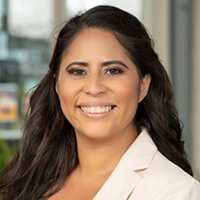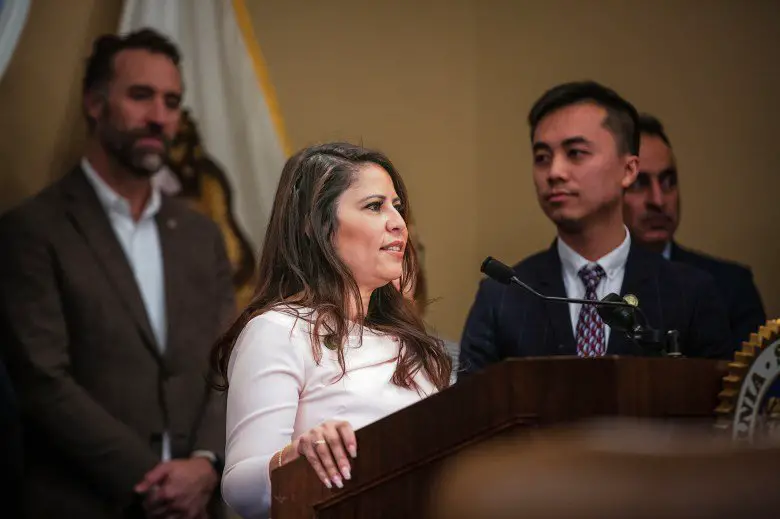In summary
To reduce the death toll from the opioid epidemic, California Assemblywoman Liz Ortega wants health insurers to cover the costs of Narcan, a nasal spray that can reverse an overdose. Of course, increasing access comes at a price.
The ubiquity of the synthetic painkiller fentanyl has supercharged the opioid crisis to the point that California schools are now making overdose treatments readily available, turning teachers and even children into emergency responders.
More than 11,000 Californians died of drug overdoses in the year ending in February, according to reports from the Centers for Disease Control and Prevention. The vast majority were caused by opioids.
Narcan nasal spray, which the Food and Drug Administration approved for over-the-counter purchases in March, has been a solution to at least reduce the amount of fatal overdoses. For freshman Assemblywoman Liz Ortega, a Hayward Democrat and union leader whose nickname is The Peoples Lobbyist, the FDA’s extraordinary move nonetheless made it inaccessible to those who might need it.
His idea: Assembly Bill 1060, which would require public health insurance providers AND private to cover the cost. The proposal came out of the Assembly with bipartisan support, but is now meeting with industry opposition and comes with an estimated $9.2 million annual price tag, a hike likely to trickle down to consumers.
Ortega and I recently spoke about the merits of the bill and the pushback it has received. The bill must be cleared by the Senate Appropriations Committee before Senators can vote to put it on the governor’s desk this fall.
This interview has been condensed for clarity and length.
Q: Tell me about your background on this issue and if this is something you have personal experience with or has touched your life in any way.
A: This occurred to me when I got to the legislature. When I got here, I started hearing more stories from families and in the news about the opioid crisis, especially fentanyl and the number of people who were dying. One of the stories that struck me when I learned about it was the number of children dying from fentanyl overdose. As a mother, all I kept thinking about was my kids and how would I feel if my little boy was playing in the park and accidentally overdosed, like we saw in San Francisco, or if my daughter was 16 and if she went to a party and someone gave her a pill, God forbid, she takes it and dies? These are the stories that I started hearing over and over again which lead me into the space where I started asking more questions and doing a little more research about it.
Learn more about the lawmakers mentioned in this story

State Assembly, District 20 (Hayward)
Then, one weekend, an article came out talking about the US Food and Drug Administration addressing this fentanyl crisis by making Narcan available over the counter. I was excited now that more people will have access to this life-saving drug, but the reverse was that it’s not affordable. Then the people who would need it most would not be able to access it because it would still cost between $50 and 100.
If I’m a struggling mother who can barely make ends meet…how can I afford to buy a life-saving drug that I may or may not use? That’s where AB 1060 came to mind. What am I going to do to address this crisis in a way that addresses accessibility, addresses accessibility, and saves lives?
Can you explain what the bill would do?
What my bill does is produce Narcan and other drugs like Narcan that reverses opioid overdoses now that it will be available over the counter, it is added to the list of covered drugs, by Medi-Cal and by private insurance. So if I walk into a Walgreens or Rite Aid, I can go get a squirt of Narcan and it’s free. I don’t have to worry about paying $50-100 so I can buy this life saving drug.
I have seen some comments and some committee members analyze the health insurance lobby, private insurers are not going to take such a thing without a fight. What have you heard from opponents and how are you working to respond to their criticisms?
Interestingly, the hospital insurance industry contacted me very early on when I first tabled (the bill) and said we may have some concerns. We will get back to you if we do. They never showed up for any of the hearings (before he walked out of the Assembly). They never sent me any letters until (June 28th). Three hours before going into the Senate hearing (committee on health), I received an email from the (California Association of Health Plans) basically saying they would go to committee and oppose my bill unless I accepted their amendments. They gave me a list of amendments three hours!
So I walked into the hearing and my opening statement was this email, addressing the fact that they were trying to force me to agree to the amendment three hours before a hearing. We have rules in the legislature that say we have to have things in print for up to 72 hours before we can vote on them. How could I walk into a hearing room, accepting amendments that I hadn’t even had the opportunity to look at?

I made it very clear to the health insurance industry that I was not going to be bullied or forced into accepting any amendments because I understand they are in the business of making profits, I am in the business of saving lives. This is what my account does.
What was the outcome of the committee hearing?
It passed unanimously. He was bipartisan.
Republicans are always skeptical of cost increases, especially when they come from the government. I think it was the Assembly room analyses this projected that there would be approximately ($9.2 million) in extra annual state and private insurance costs to cover Narcan if this bill passed. What’s your response to fiscal conservatives who are concerned about how to deal with cost increases, especially at a time when we’re dealing with budget deficits that could stick around for years to come?
I did the math* and ($9.2 million) that’s about $17.4 million less than the $26 million we’re spending on our health care system right now on all these overdoses and people going to the emergency room. So, thinking about the deficit, we as policymakers have to make a choice: do we cut costs or do we improve quality of life and save lives? My account does both. We save resources and save lives.
*(Use a 2017 CDC report On the economic impact of opioid overdoses and data from a statewide naloxone distribution program to determine the number of preventable deaths, Ortegas’ office said fatal overdoses cost California’s health care system $26.7 million annually.)
Obviously fentanyl is an issue that both sides have been trying to address. Have you been surprised by the responses you’ve received from colleagues across the aisle who are willing to do this?
I was amazed at the amount of support we received and the amount of stories and people that would be impacted. Those who have already lost (loved ones) and it’s too late for them have come to me and really appreciate what I’m doing. It’s not too late for others, and that’s why I’m doing it. My husband had a colleague who had no idea she asked to speak to him very quickly in private. She said, “Please tell your wife thank you.” His son was going to college, he was a good kid, he thought he was smoking marijuana, found him dead in the morning.
Oh my gosh.
He said he had enough fentanyl (in his system) to kill 10 people. She was extremely grateful for AB 1060 and what I’m doing to bring light to this. She said it might be too late for her, but it’s not too late for other mothers.
For those who might be skeptical of your legislation what would you tell them?
The opioid epidemic is a complex issue that will require addressing the root causes of addiction and equipping law enforcement to take down some high-level drug dealers. I’m on (the Assembly) public safety (committee), so I also (meet) the war on drugs (rhetoric) and (proposals) seeking to increase sentences. I focus on high-end retailers and hold them accountable.
But I also want to make sure that we are evidence based and that we are providing care and supportive services. And in the meantime, get this life-saving drug into as many hands as possible while saving money for our healthcare system.
#California #Health #Insurance #Cover #Opioid #Overdose #Medication
Image Source : calmatters.org